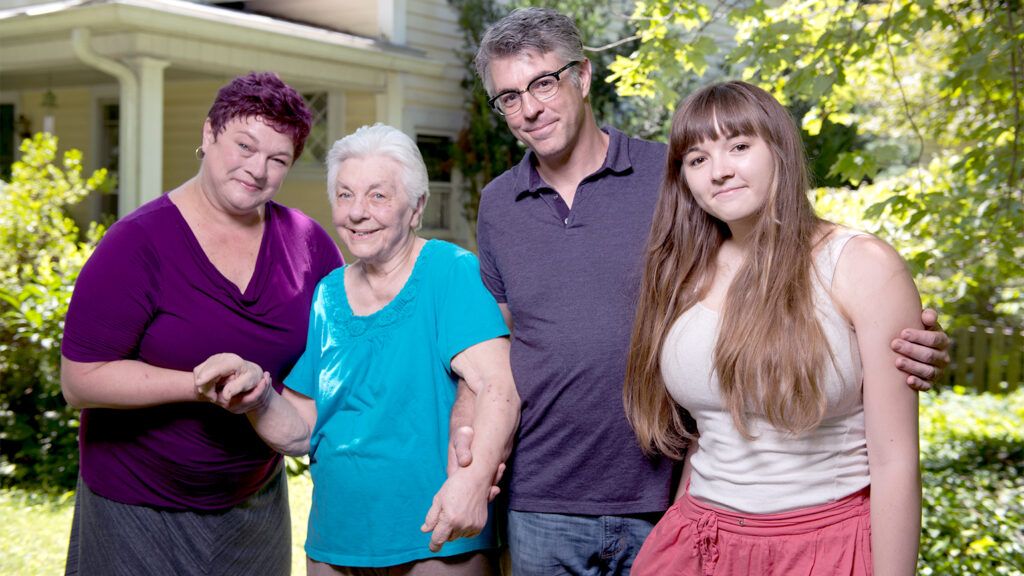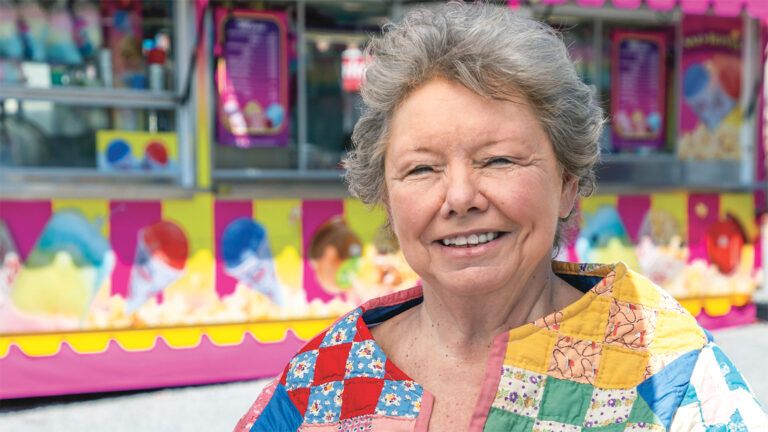Grace, my teenage daughter, sat on our couch with my 87-year-old mom, goofing around on her phone. “You need to do homework,” I reminded her.
Something stirred inside Mom. “Don’t you tell her what to do,” she said.
“That’s my job,” I said lightly. “I’m her mommy.”
She stared at me. “You’re not her mommy.”
Grace’s eyes widened. “Well then, who is she?” Grace asked.
Mom struggled to come up with an answer, but I was ready. “She is my daughter,” I insisted. “And I am your daughter.”
“You. Are. Not. My. Daughter,” Mom said, her face pinched.
That stung. Not her daughter? I was the youngest of her six kids, and we’d always been close. Couldn’t she see the love I had for her? Intellectually, I knew this was a symptom of her dementia, but tell that to my heart.
Enter my husband, Mondy. “Virginia,” he said to my mom, with theatrical flair. “I’m organizing a heist tonight. I need you to drive the getaway car.” Instantly the tension was swept away. Mom sat up, smiling, saying, “I’m calling the police on you.” She knew he was joking and enjoyed foiling the scheme.
Why couldn’t I be more like Mondy? He didn’t contradict Mom. Instead he played off her—the more madcap, the better. It was like watching two wacky improv comedians. I knew what he was doing. How he did it, even. I was the one who’d told him the ways improvisation and dementia care were similar. Yet there I was again, like the straight man in a comedy sketch who was never in on the fun.
That was how I’d met Mondy in 1990, doing improv comedy. I was living in Milwaukee, Wisconsin, doing administrative work for an improv group, when a friend invited me to join a troupe doing a Monty Python revue. Mondy was part of the troupe. No one could make me laugh the way he did. We started performing together. His razor-sharp intellect, my physical humor—we were a great team. It seemed natural that we’d make a life together.
But with the laughter came sadness. My parents were living in Illinois, enjoying retirement, when Dad started showing signs of dementia. Mom threw herself into caring for him. She’d always been happiest when she was busy. She’d thrived on running our household, raising the six of us, making sure we had a strong spiritual foundation.
In the end, the strain of caring for Dad was too much. My parents moved to St. Louis, Missouri. Mom moved in with one of my sisters, and Dad entered a long-term care facility.
I wanted to understand this disease that steals more than memories—it threatens who we are. One night I typed into Google “What are the rules for caring for someone with Alzheimer’s?”
Reading through the results, I came across this line: “Step into their world.” A basic tenet of improvisational theater. Don’t argue the premise. Build on it. Don’t say no. Say “Yes, and…” It felt like a message meant just for me. Caregiving for a loved one with Alzheimer’s takes a toll on even the strongest among us. This was a way I could make a difference, teaching people how to defuse conflicts using the principles of improv.
I came up with a presentation and asked caregiver support groups if I could speak to them. When Mondy didn’t have an acting gig, he’d join me and we’d do our two-person show. “This is just what I’ve been looking for,” family caregivers would tell me. Word spread. I retooled the material for corporate team-building workshops too. Soon I was getting paid to share my advice.
Dad died in 2000, when Grace was two. Mom was 75 and spent summers with us. She doted on Grace. But several years later, it was clear she was having trouble. One day, my sister called from St. Louis. “Mom got lost driving home from the grocery,” she said. A six-block drive. My sister worked full-time. Mondy’s and my schedules were more flexible. We decided Mom would move in with us. But we couldn’t do that in Milwaukee. Our families were too far apart.
“What about Asheville, North Carolina?” Mondy suggested. “You’d have two sisters close by.”
Asheville’s thriving arts scene would be perfect for Mondy’s acting and commercial voiceover work. Surely I’d be able to find speaking engagements. We took a leap of faith and made the move in 2006. What we didn’t foresee was the recession. Mondy couldn’t find work. I struggled to get bookings as well.
With both of us caring for Mom full-time, Mondy and I took on different roles. I managed Mom’s meds, helped her get showered and dressed, made sure she ate a healthy diet. I wasn’t looking to turn our interactions into a comedy sketch. I just wanted to get to the next thing on my to-do list. Seeing to Grace. Chores. Making new contacts for speaking engagements. My workshops were our main source of income.
Mondy? He was Mr. Fun. All the improv techniques I’d been teaching were second nature to him. He liked performing. Without regular acting gigs, he turned his creative energies toward Mom.
Seeing a squirrel out the window, leaping from branch to branch, she mistook it for a monkey. Mondy would go with it. He’d say, “Yes, and it seems a bit early for monkey season.” Mom would giggle and say something even sillier. “Yes, and…” Mondy would reply. Round and round they’d go. When Mom said she used to roller-skate down our street as a girl, Mondy said, “Yes, I can see you zipping by.” It didn’t matter that Mom had grown up in West Virginia, not North Carolina. Mondy was all about affirming. Getting her talking. Mom thrived on the attention.
It was so obvious. But too often I couldn’t do it. I found myself correcting Mom, trying to get her to be who she was. She gravitated to Mondy. He could do no wrong. Me? By trying to get her to be the mom I knew, I made her feel as if she were wrong. “Why are you so mean?” she’d ask.
Things got worse after Mom was diagnosed with diabetes. I had to be even more careful about her diet. Mom didn’t understand why she couldn’t have a second bowl of ice cream. Sometimes she’d lash out and curse at me. My mom, who was so sweet she considered shoot a swear word.
I was frustrated. “What am I missing?” I asked Mondy.
“You know what it is. She’s your mom,” he said. If it were my mom, I would be in your shoes.”
I knew he was right. I wanted to be able to have a real conversation with Mom, to talk about my daughter and hear my mom’s perspective. To be as connected to her as I’d felt growing up. Grace had been writing down the family stories Mom often repeated. One day we’d treasure them. Right now, though, what I wanted most from Mom was something she couldn’t give me.
Maybe that’s why it hurt so much that night to hear her say, “You. Are. Not. My. Daughter.” I needed to prepare for a presentation, but long after Mom had gone to bed, I sat at my desk, her words echoing in my mind. I had no clever comeback, no way to handle this. Yes, and? No, I just couldn’t go there.
We’d been living in North Carolina, living with Alzheimer’s, for nine years by then. In some ways, our lives were more stable. Mondy had purchased a local beeswax candle-making company. He’d moved the works to a barn on our property, enabling him to work from home. Grace had grown into a mature and responsible teenager. We were active in theater in town. Acting was less a source of income and more a welcome release. My sisters subbed for us, allowing us to take a weekend away as a family from time to time. Dementia may have overtaken her mind, but physically
Mom was strong. I was convinced that the stimulation she got from us, Mondy especially, was part of the reason. Mom might have been healthy, but the disease was progressing. She was less verbal, more resistant. Everything was a battle. She didn’t want to get dressed. Didn’t want to go to bed. Didn’t like the meals I made.
I got up from my desk and walked to Mom’s room. I stood in the doorway for a while, watching her sleep. She’d been the first to laugh at my jokes. She’d bandaged my knees when I fell, taught me God was there when I was afraid. That woman was still there, but her memories weren’t. And I wasn’t that little girl anymore. We’d both changed, but I was the only one clinging to the past.
In improv, there’s no clinging to a particular role. In seconds, you can go from being a waitress to an astronaut. It’s about accepting whatever comes. The way my mother had said God accepts us. With all our flaws and weaknesses yet loving us anyway. The pain I felt wasn’t just that I was losing my mom. I felt I was losing part of myself. I had to let go of it all. Maybe in Mom’s eyes, I was no longer her daughter. That didn’t make me love her any less. I could still be a part of her world, if I was willing to join her there.
A few days later, I took a call for a booking on the porch, where I could talk without Mom joining in. When the call ended and I went back into the kitchen, there was Mom devouring Moose Tracks ice cream right from the quart. Her blood sugar was already high from getting into Grace’s Easter candy that morning. This was dangerous. I wanted to yell, “You can’t have ice cream! You have diabetes!” But I caught myself. “It’s such a hot day,” I said. “I’m glad you found the ice cream.”
Mom looked down at the carton. “Let me get you some,” she said. She set the ice cream on the counter and opened the cabinet to get a bowl. I grabbed the Moose Tracks and stuck it back in the freezer. When Mom turned, I said, “Thanks for the bowl. Could you fill it with water? I’d like to put it on the porch for the dogs.” Mom smiled, happy to help.
People with Alzheimer’s are told what they can’t do, what’s not true, what not to say, at every turn. Of course, they shut down. Who wouldn’t? From then on, I acted more like Mondy and made “Yes, and…” my go-to response. My relationship with Mom eased, even as the challenges of caring for her grew.
Last year, we moved Mom to a memory care facility. We visit her almost daily. At 92, she’s still physically fit but she doesn’t always know who we are. That’s okay. I’m glad to step into her world and love her right where she’s at.
Read more: 7 Keys to Caring for a Loved One with Dementia
For more inspiring stories, subscribe to Guideposts magazine.





